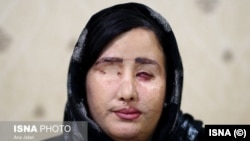One of several Iranian women attacked with acid in the city of Isfahan in 2014 says her yearslong legal battle for justice remains on course despite an Iranian lawyer saying this week that the case has closed.
In an interview with state news agency ISNA published Friday, Soheila Jorkesh said she does not know lawyer Hossein Abbas Alizadeh, who declared the case closed in an ISNA interview posted Wednesday. Jorkesh said she has received some of a blood money payment known as Diyah, but plans to appear in court next week to seek the full payment after someone raised an objection to her request.
Under Iran’s Islamic laws, Diyah is paid as financial compensation to victims or heirs of a victim in cases of murder, bodily harm or property damage.
Full payment of Diyah
In his interview with ISNA, Abbas Alizadeh said he had been representing three of the female Iranian victims of the 2014 Isfahan acid attacks. He said the victims, whom ISNA did not name, had received court-ordered blood money payments from the Iranian government after authorities failed to find those behind the attacks and bring them to trial. Abbas Alizadeh said the receipt of the payments meant the case was closed, but added that it could re-open if the perpetrator or perpetrators are arrested in the future.
Jorkesh told ISNA that she needs her blood money to be paid in full in order to complete surgical procedures to preserve sight in her left eye. The 2014 attack blinded her right eye and badly damaged her left one, prompting her to travel to the U.S. city of Boston for surgery last year, according to Iran’s state-authorized IFP news service.
Jorkesh said a doctor in the U.S. had told her to return from Iran within two months for more surgery on her left eyelid, but she postponed the procedure because of the legal issues with her blood money. She said she has been trying to preserve the sight in her left eye with the help of eye drops sent to her by friends in the U.S. She said she thanks God that she still has some vision and hopes to keep it.
Acid attack in Isfahan
An assailant or assailants on motorcycles threw acid at Jorkesh and three other women who had their car windows open while driving in the central city of Isfahan in October 2014. The attacks sparked public protests in Isfahan and elsewhere by Iranian women who said they believed the victims were targeted because they were deemed not to be properly wearing an Islamic hair covering or hijab.
Iranian officials at the time denied that the attacks were motivated by Islamist anger toward women perceived to be dressed immodestly. But authorities have not apprehended the attacker or attackers.
This report was produced in collaboration with VOA’s Persian Service.




